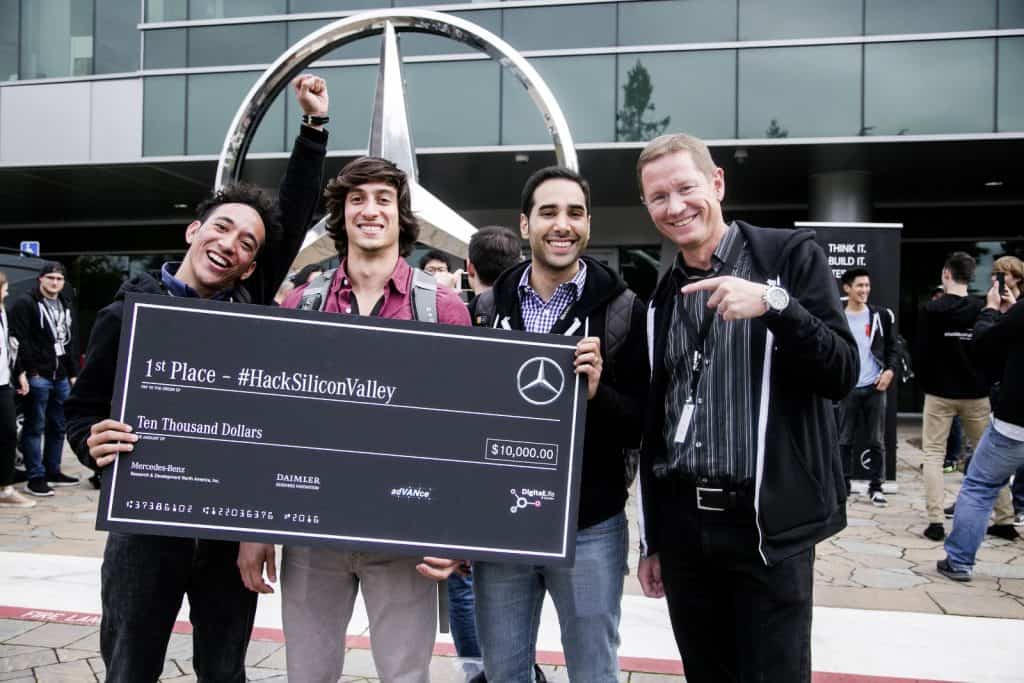 Motivated students and young professionals met on November 5-6 in Silicon Valley, to compete in the fifth 24-hour hackathon jointly organized by the Business Innovation Team of Mercedes-Benz Research & Development North America, Mercedes-Benz Vans and DigitalLife@Daimler.
Motivated students and young professionals met on November 5-6 in Silicon Valley, to compete in the fifth 24-hour hackathon jointly organized by the Business Innovation Team of Mercedes-Benz Research & Development North America, Mercedes-Benz Vans and DigitalLife@Daimler.
The task was to develop intelligent transport and mobility concepts for the Mercedes-Benz Vans division. With its strategic initiative “adVANce”, Mercedes-Benz Vans is transforming itself from a vehicle manufacturer into a provider of integrated, customer-focused solutions. Since the start of the year, the Future Transportation Systems team in Silicon Valley has been working on concrete logistics concepts. The team’s “garage” in Menlo Park was also the venue for the hackathon. It was here were the competitors found the inspiration for clever concepts and fresh ideas around the intelligent connectivity of vans, goods and people with the Internet of Things and cloud data.
Experienced mentors were on hand to help the teams with words and deeds. After 24 hours, the ideas were pitched to the judges at the headquarters of Mercedes-Benz Research & Development North America in Sunnyvale. Each team had four minutes in which to convincingly present their propositions to an interdisciplinary panel of expert judges from Mercedes-Benz. The jury rated criteria such as the degree of innovation and business potential of the ideas as well as the use of IoT and cloud technologies and the functionality of the prototype.
Rasheq Zarif, Head of Business Innovation at Mercedes-Benz Research & Development North America: “Mobility means more than four wheels on the road, it also includes the courage to do the unconventional. We’ve demonstrated this with car2go and the self-driving F 015. Sometimes you succeed, sometimes you don’t. An inventive spirit is part of our DNA. We rely on that spirit every day in our work – and we were glad to see the same with the top talents at the hackathon.”
The winning team “MBarc” developed an app that enables the driver at all times to assess the damage on the vehicle. The driver uses his smartphone to take a 360-degree shot of his van. The app then accesses data-based reference models, compares them with the vehicle and identifies possible damage. The damage is then analysed and the need for repair is assessed – a quick and simple way to optimize fleet management.
The second-placed team, “FleetWise”, was successful with the idea of intelligent fleet routing for electric vehicles. Machine learning is employed to determine the usage of the vehicle battery based on current traffic situations and the driver’s driving style as well as on the weight and size of the vehicle. As a next step, the app suggests a suitably energy-saving route or indicates the way to the nearest charging station.
Third place went to the “VANage” team, which used IoT- and cloud-based sensors, route information and driver profiles to accurately predict maintenance intervals and thus to increase driver safety as well as to efficiently plan vehicle usage times.
Nicolaas Tempelhoff, Head of Mercedes-Benz Vans Future Transportation Systems North America: “With the Hackathon we were not only able to inspire smart minds for our brand but also gain concrete ideas for digital solutions around our transporters. We now want to work intensively with the interested teams and discuss possibilities for implementation.”
At the center of innovation: 21 years of Mercedes-Benz in Silicon Valley
The headquarters of Mercedes-Benz Research & Development North America in Sunnyvale is part of the global R&D network with a focus on the digitalization of vehicles. Mercedes-Benz in Silicon Valley has undergone consistent expansion since 1995. With just 20 employees at the opening over 20 years ago in Palo Alto, the figure is more than 240 in Sunnyvale. Alongside customer research and connectivity, new development areas for the mobility of the future have been added such as autonomous driving, advanced user experience design and machine learning. In addition to automotive technologies, the Business Innovation team is developing new business models for mobility inspired by technological, social and cultural trends. Since 2012, the team has been testing and evaluating profitable business models on a proof-of-concept basis.